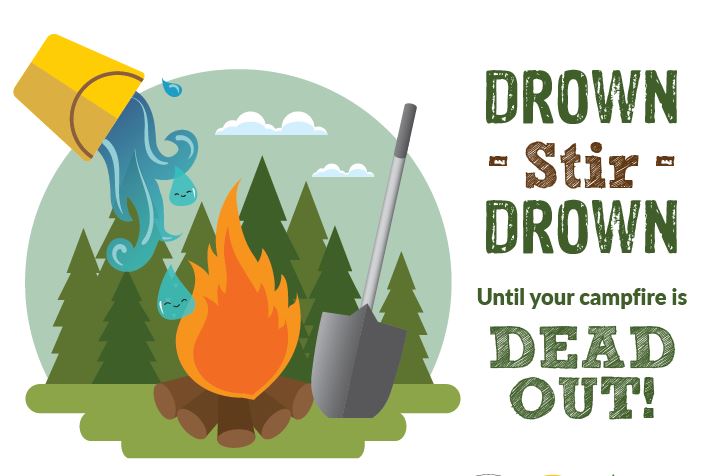Oregon Dept. of Forestry – 05/26/21 3:24 PM
SALEM, Ore. – The first holiday getaway of the season is finally here as families and friends look forward to Oregon’s great outdoors. AAA reports that about 485,000 Oregonians plan to travel over the Memorial Day weekend, a big increase from 2020.
Also up will be fire danger. As people head to their favorite camping spot this weekend, fire professionals are spreading a word of caution with temperatures expected to be near 90 degrees.
“It’s time for everyone to put their Smokey hat on,” said Oregon Department of Forestry’s Fire Prevention Coordinator Tom Fields. “The continued drought and unseasonably warm weather we’re facing could lead to unintentional wildfires.”
Fields says that ODF firefighters have already been busy this year with 267 fires burning over 1,900 acres, more than twice the 10-year average for number of fires. Fire crews on patrol have also extinguished about a dozen abandoned campfires.
“The last thing anyone wants is to have their holiday weekend ruined by not putting out their campfire.” Fields reiterated that people should follow well-known fire prevention tips listed below.
- Know before you go: Before going camping, always contact the forest district, agency or landowner first to learn if there are any current campfire restrictions where you plan to recreate.
- Have water and fire tools on site: Bring a shovel and a bucket of water to extinguish any escaped embers. When you are ready to leave, drown all embers with water, stir the coals, and drown again. Repeat these steps until the fire is DEAD out. If it is too hot to touch, it is too hot to leave.
- Select the right spot: Where campfires are allowed, choose a site with an existing ring. Fire pits in established campgrounds are the best spots. If you choose to build a campfire, avoid building it near your tent, structures, vehicles, shrubs or trees, and be aware of low-hanging branches overhead. Clear the site down to bare soil, at least five feet on all sides, and circle it with rocks. Store unused firewood a good distance from the fire.
- Keep your campfire small: A campfire is less likely to escape control if it is kept small. A large fire may cast hot embers long distances. Add firewood in small amounts as existing material is consumed.
- Attend your campfire at all times: A campfire left unattended for even a few minutes can grow into a costly, damaging wildfire. Stay with your campfire from start to finish until it is dead out, as required by law. That ensures any escaped sparks or embers can be extinguished quickly.
- Consider alternatives to a campfire this summer: Portable camp stoves are a safer option to campfires at any time of year. Areas that prohibit campfires outside maintained campgrounds with established fire pits often allow camp stoves.
- Never use gasoline or other accelerants: Don’t use flammable or combustible liquids, such as gasoline, propane or lighter fluid, to start or increase your campfire.
- Burn ONLY local wood: Hauling your firewood to a remote campground can potentially transport invasive species. Instead, buy it where you’ll burn it or gather wood on site where permitted. State regulations prohibit the open burning of any other material that creates dense, toxic smoke or noxious odors.
Escaped campfires can be costly. State and federal law require the proper clearing, building, attending and extinguishing of open fires at any time of year. While citations and fines may apply, the biggest potential cost for an escaped campfire is firefighting costs. These can range from a few hundred to tens of thousands of dollars or more.
May is Wildfire Awareness Month. Visit www.keeporegongreen.org for more wildfire prevention tips and see Smokey Bear at https://www.smokeybear.com/en.












